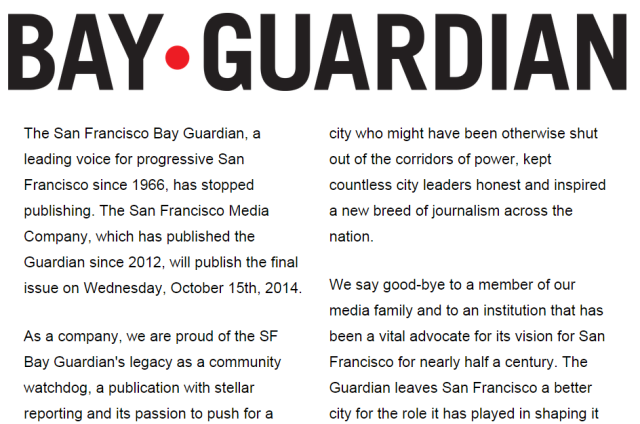It wasn’t just the Internet or social media — a big chain that owned SF Weekly tried to kill its competitor and wound up damaging both papers beyond repair
By Tim Redmond
JANUARY 20, 2015 – Since there’s a final commemorative edition of the Bay Guardian coming out, and since there’s a lot of confusion about what happened to the paper, I’m going to take a second to give my perspective.
The tech revolution that C.W. Nevius talks about was, of course, a factor: When the Internet became the place to go for classified ads and personal/relationship seekers, alt-weeklies, which lived off those markets, were hurt.
Daily newspapers all over were hurt, too, but the dailies by then were all owned by huge corporations that could afford major losses while they figured out what to do. (Some of them still haven’t figured it out.) I personally think the model of the one giant monopoly daily in big cities is going to die fairly soon; I think we will see a proliferation of digital dailies. This one is a nonprofit; others will find other models.
Digital publications haven’t been able to attract the ad revenue that weeklies and big dailies used to get. On the other hand, delivery is much cheaper – no need to own a press or pay a press bill. No need for newsracks or distributors.
With a fraction of the revenue the Bay Guardian had in its prime, 48hills will be able to hire a similar-sized news staff and do a serious job covering the city. We’re not there yet, but we’ll get there.
But the death of the Guardian wasn’t caused by the failure of the staff to tweet enough – or just by the Internet. There are alt-weeklies all over the country that are surviving and thriving in this new era. The East Bay Express is one of them. Yeah, we made business mistakes; so does every other small business. But they weren’t fatal.
Help us save local journalism!
Every tax-deductible donation helps us grow to cover the issues that mean the most to our community. Become a 48 Hills Hero and support the only daily progressive news source in the Bay Area.
What happened to the Guardian is a much larger, and more important, story. The paper was unable to survive because a chain competitor with deep pockets ran a scorched-earth campaign for more than ten years to put the local independent out of business.
In the process, SF Weekly and its Phoenix-based owners cut ad rates so low that the devalued alt-weekly advertising in SF to the point where neither paper could make a profit.
SF Weekly lost millions, year after year after year. No matter: New Times, later Village Voice Media, was a huge profitable chain and could afford the losses. In the end, the VVM folks figured, the Guardian would go bust and they’d have the market to themselves.
We didn’t go along with the plan. Instead, Bruce Brugmann and Jean Dibble put everything they had into the paper, kept it alive, and fought back. We sued for unfair business practices, and won – but it took more than five years, and during that entire period the predatory pricing continued.
In the end, the suit was settled – and while I can’t comment on the settlement, you can draw your own conclusions.
Bruce and Jean didn’t “cash out.” They had no choice – if they hadn’t sold the paper when they did, it would have folded right then. There was no money left. So they did what they had to do to keep the Guardian alive.
Then VVM sold the SF Weekly to the same company, and after a while, that company decided that it made no sense to have two weekly products in the same market.
SF Weekly may be somewhat profitable today – now that it finally has what the old owners wanted all along, a monopoly on the alt-weekly market. But the strategy VVM adopted wound up deeply wounding both papers, and making it impossible for either of them to thrive. The Weekly is much smaller than it once was, with a much reduced staff (and it may be turning into an entertainment publication.)
If the assholes from Phoenix hadn’t insisted on having the market all to themselves, both papers might be publishing, and thriving, today. Maybe not; maybe the market isn’t big enough for two successful alt-weeklies that put money and effort into serious news coverage. But now it appears that soon we may have none at all.
In which case, a chain that wanted a monopoly will have killed both papers.
The East Bay Express has a brilliant publisher (my friend Jody Colley), a talented staff, a smart business plan, excellent management, and a great, growing market. It has writers who use social media better than I did at the Guardian.
But the story of what happened in San Francisco has to include the history of chain vs. local competition and what happens when someone with a lot of money decides to take over a market. Every local store that has tried to compete with WalMart or Home Depot or Loew’s or Amazon knows the deal. You can do the best job possible, and be the smartest business person in the world, and have great products — but the chains can still hurt you, and sometimes, kill you.





